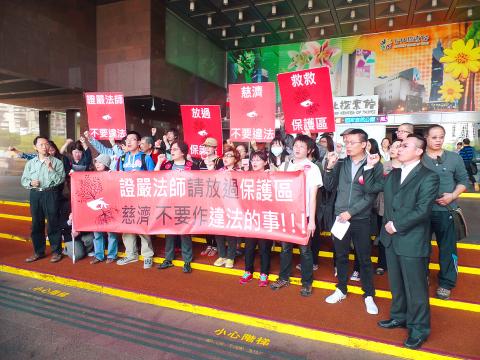Taipei Mayor Ko Wen-je’s (柯文哲) comments about a project by the Buddhist Compassion Relief Tzu Chi Foundation on a disputed plot of land in Neihu District (內湖) drew a heated response from Buddhist Master Shih Chao-hwei (釋昭慧) yesterday.
“I cannot help but severely criticize Ko,” Shih said in a Facebook post, protesting what she called Ko’s “humiliation” of the foundation.
“It is like biting the hand that feeds you,” Shih said. “The mayor of Taipei has treated with hostility a noble organization that helps him care for the city’s weak and disadvantaged.”

Photo: Kuo An-chia, Taipei Times
She said Ko had not done his homework and carefully reviewed the foundation’s plan before calling it a “development project,” as if it were an urban renewal plan backed by a business group.
The site is to be used to manufacture blankets for use in disaster relief and would serve as a logistics center in the event of an emergency, she said.
In a recent interview with CK Potpourri, the Taipei Municipal Jianguo High School magazine, Ko said it was “strange” that the foundation had bought the land in an environmentally protected zone in Neihu for development.
The project has been mired in controversy for more than 10 years because of opposition from residents and environmental groups.
Tree Party policy director Pan Han-shen (潘翰聲) said that environmental groups oppose the project because it would set a poor precedent, opening the door for large corporations or those with influence to expedite approval for use of land in environmentally protected zones.
He said the Tzu Chi Foundation had sought to have the project approved as an individual case, without considering the wider impact it would have and that it has refused to have the project undergo an environmental impact assessment.
In December last year, Ko said he was opposed to the project as a matter of principle, stating that there was no need for Taipei to take from the wilderness to make room for further population growth.
In response to Shih’s remarks, Taipei City Government spokesman Sidney Lin (林鶴明) said Ko was only discussing the facts of a case that has attracted substantial public interest, and was not taking aim at any particular organization.
The city was extremely grateful for the foundation’s assistance in dealing with the aftermath of last month’s plane crash, Lin said.

The manufacture of the remaining 28 M1A2T Abrams tanks Taiwan purchased from the US has recently been completed, and they are expected to be delivered within the next one to two months, a source said yesterday. The Ministry of National Defense is arranging cargo ships to transport the tanks to Taiwan as soon as possible, said the source, who is familiar with the matter. The estimated arrival time ranges from late this month to early next month, the source said. The 28 Abrams tanks make up the third and final batch of a total of 108 tanks, valued at about NT$40.5 billion

A group from the Taiwanese Designers in Australia association yesterday represented Taiwan at the Midsumma Pride March in Melbourne. The march, held in the St. Kilda suburb, is the city’s largest LGBTQIA+ parade and the flagship event of the annual Midsumma Festival. It attracted more than 45,000 spectators who supported the 400 groups and 10,000 marchers that participated this year, the association said. Taiwanese Designers said they organized a team to march for Taiwan this year, joining politicians, government agencies, professionals and community organizations in showing support for LGBTQIA+ people and diverse communities. As the first country in Asia to legalize same-sex

MOTIVES QUESTIONED The PLA considers Xi’s policies toward Taiwan to be driven by personal considerations rather than military assessment, the Epoch Times reports Chinese President Xi Jinping’s (習近平) latest purge of the Chinese People’s Liberation Army (PLA) leadership might have been prompted by the military’s opposition to plans of invading Taiwan, the Epoch Times said. The Chinese military opposes waging war against Taiwan by a large consensus, putting it at odds with Xi’s vision, the Falun Gong-affiliated daily said in a report on Thursday, citing anonymous sources with insight into the PLA’s inner workings. The opposition is not the opinion of a few generals, but a widely shared view among the PLA cadre, the Epoch Times cited them as saying. “Chinese forces know full well that

Travel agencies in Taiwan are working to secure alternative flights for travelers bound for New Zealand for the Lunar New Year holiday, as Air New Zealand workers are set to strike next week. The airline said that it has confirmed that the planned industrial action by its international wide-body cabin crew would go ahead on Thursday and Friday next week. While the Auckland-based carrier pledged to take reasonable measures to mitigate the impact of the workers’ strike, an Air New Zealand flight arriving at Taipei from Auckland on Thursday and another flight departing from Taipei for Auckland on Saturday would have to